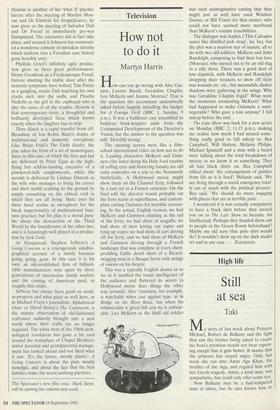Television
How not to do it
Martyn Harris
How can you go wrong with Alec Gui- ness, Lauren Bacall, Geraldine Chaplin, Leo McKern and Jeanne Moreau? That is the question the accountant undoubtedly asked before happily initialling the budget for A Foreign Field (BBC 1, Sunday, 9 p.m.). It was a bulldozer cast assembled to bulldoze book-keepers aside from the Unimpeded Development of the Director's Vision, but the answer to the question was still: 'Horribly wrong'.
The opening scenes were like a film- school instructional video on how not to do it. Leading characters McKern and Guin- ness (the latter doing his Holy Fool routine of rolling eyes and fluttering hands) are old army comrades on a trip to the Normandy battlefields. A Hollywood movie might show them on the Channel ferry, followed by a fast cut to a French cemetery. On the final edit the director would probably cut the ferry scene as superfluous, and contem- plate cutting Guinness for horrible overact- ing. In the actual, English version, we had McKern and Guinness chatting at the rail of the ferry; we had shots of seagulls; we had shots of men letting out ropes and tying up ropes; we had shots of cars driving off the ferry; and we had shots of McKern and Guinness driving through a French landscape that was complete in every chest- prodding Gallic detail short of a Ricard- swigging man in a Basque beret with strings of onions on his bicycle.
This was a typically English drama in so far as it insulted the visual intelligence of the audience and flattered its actors (a Hollywood movie does things the other way around). Alec Guinness, for example, is watchable when cast against type, as in Bridge on the River Kwai, but when his whimsicality is given full rein he is unbear- able. Leo McKern as the bluff old soldier was such unimaginative casting that they might just as well have used Windsor Davies, or Bill Fraser for that matter, who could not have seemed more moribund than McKern's routine irascibilities.
The dialogue was leaden ('This Calvados tastes like distilled jock strap', ha, ha), but the plot was a neutron star of inanity, all to do with two old soldiers, McKern and John Randolph, competing to find their lost love (Moreau), who turned out to be an old slag in a silly dress. There was a good deal of low slapstick, with McKern and Randolph dropping their trousers to show off their war wounds etc. etc., but meanwhile darker shadows were gathering in the wings. Why was Geraldine Chaplin frigid? What were the memories tormenting McKern? What had happened to make Guinness a semi- vegetable? Who gave a toss anyway? I fell asleep before the end.
The Late Show was back for a new series on Monday (BBC 2, 11.15 p.m.), making me realise how much I had missed some- thing really good to fall asleep to. Bea Campbell, Will Hutton, Melanie Philips, Michael Ignatieff and a man with a beard were talking about the total breakdown of society as we know it or something. They all had black shirts on. Bea Campbell talked about 'the estrangement of politics from life as it is lived'; Melanie said, 'We are living through a social emergency total- ly out of synch with the political process'. Bea said, 'We should do more engaging with places that are in terrible pain'.
I wondered if it was actually compulsory to have a black shirt before they invited you on to The Late Show to become An Intellectual. Perhaps they handed them out to people in the Green Room beforehand? Maybe my old navy blue polo shirt would do? It wouldn't show up on the dark studio set and in any case . . . Zzzzzzzzzz.


































































 Previous page
Previous page